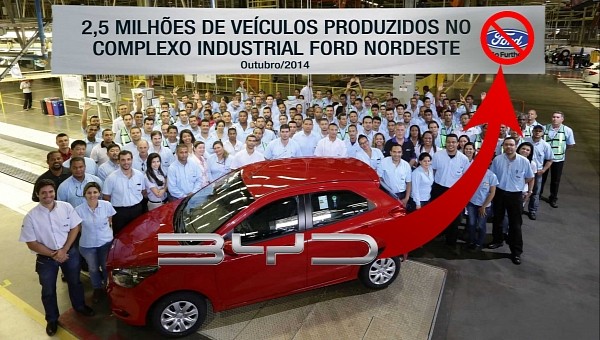Irony is always elaborate, but it may have broken new records for that quality in Brazil. Ford announced on January 11, 2021, that it would close three factories in Brazil. The largest one was in Camaçari, Bahia. The company justified that by saying its need to focus on more profitable models – and the electric transition. After some time looking for a buyer for the “Complexo Industrial Ford Nordeste,” there is finally a winner: BYD, a Chinese titan in electric vehicles.
The Bahia State government called BYD “the biggest EV maker in the world” while officially disclosing that the Chinese company signed a Memorandum of Understanding (MoU) to install three factories where Ford once had its industrial complex. One will make electric chassis for buses and trucks, one will process iron phosphate and lithium, and the third will make battery electric vehicles (BEVs) and plug-in hybrids (PHEVs).
BYD will invest R$3 billion ($583 million at the current exchange rate) to prepare the factories for these operations. Work will start in June 2023, and two of the plants should be ready by September 2024, with operations beginning one month later, in October 2024. The third factory (probably the one making cars) will be finished by December 2024, starting to make BEVs and PHEVs in January 2025.
Automotive Business tried to talk to BYD about its plans for the new factories. After all, it would be interesting to learn if these cars will be manufactured for the local market or exported. If BYD made Blade Batteries in Brazil, that would make a lot of sense, but there is no confirmation about that. In fact, the chemical plant will just process the raw materials BYD needs to make these cells but probably prefers to keep manufacturing them in China.
BYD made sure to reinforce the temporary character of MoUs. According to the company, there are points in the agreement that still need to be adjusted. It said it would only discuss the deal after all issues were solved. The Bahia State government must have taken notes. It promised tax incentives until the end of 2032, but it may need to do more to ensure the company will really have these factories there.
If everything goes according to the plan, BYD will directly train and employ 1,200 workers in these factories. It also committed to hiring local companies to make all construction jobs necessary to adapt what once was a Ford plant to its needs.
BYD will invest R$3 billion ($583 million at the current exchange rate) to prepare the factories for these operations. Work will start in June 2023, and two of the plants should be ready by September 2024, with operations beginning one month later, in October 2024. The third factory (probably the one making cars) will be finished by December 2024, starting to make BEVs and PHEVs in January 2025.
Automotive Business tried to talk to BYD about its plans for the new factories. After all, it would be interesting to learn if these cars will be manufactured for the local market or exported. If BYD made Blade Batteries in Brazil, that would make a lot of sense, but there is no confirmation about that. In fact, the chemical plant will just process the raw materials BYD needs to make these cells but probably prefers to keep manufacturing them in China.
BYD made sure to reinforce the temporary character of MoUs. According to the company, there are points in the agreement that still need to be adjusted. It said it would only discuss the deal after all issues were solved. The Bahia State government must have taken notes. It promised tax incentives until the end of 2032, but it may need to do more to ensure the company will really have these factories there.
If everything goes according to the plan, BYD will directly train and employ 1,200 workers in these factories. It also committed to hiring local companies to make all construction jobs necessary to adapt what once was a Ford plant to its needs.








